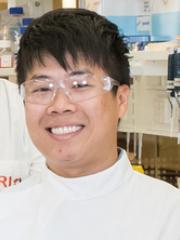Dr Kelvin Tuong

Researcher biography
Dr. Kelvin Tuong is a Senior Research Fellow/Group Leader at the Ian Frazer Centre for Children's Immunotherapy Research (IFCCIR), Child Health Research Centre. He is interested in single-cell analysis of immune cells and harnessing adaptive immune receptors for understanding immune cell development and function in health and in cancer.
Dr. Tuong was born and raised in Singapore and moved to Brisbane, Australia, after completing national service in Singapore and obtaining a Diploma in Biomedical Laboratory Technology (Ngee Ann Polytechnic).
Dr. Tuong was originally trained as a molecular cell biologist and gradually transitioned into bioinformatics during his post-doctoral training. He has been very prolific for an early career researcher, having published >70 articles since 2013, with nearly a third of them as first/co-first or last author and has a stellar track record of pushing out highly collaborative work in prestigious journals including Nature, Cell, Science, Nature Medicine, Nature Biotechnology J Exp Med etc. He has the rare combination of having excellent laboratory and bioinformatics skill sets which provide him a strong command of both fundamental immunology and computational approaches.
Dr. Tuong completed his undergraduate Bachelor's degree in Biomedical science with Class I Honours, followed by his PhD in macrophage cell biology and endocrinology at UQ (Prof. Jenny Stow lab and Emiritus Prof. George Muscat lab, IMB, UQ). He then went on to a post-doc position with Emiritus Prof. Ian Frazer (co-inventor of the Gardasil cervical cancer vaccine, UQ Frazer Institute, Translational Research Institute) where he worked on HPV immunology, cervical cancer and skin cancer. In his time in the Frazer lab, he developed an interest in bioinformatics analyses as a means to tackle and understanding immunology problems in health and disease. He then moved to the UK and joined Prof. Menna Clatworthy's lab at the University of Cambridge and Dr. Sarah Teichmann's lab at the Wellcome Trust Sanger Institute. He has focused his interests on single-cell analyses of tissue immune cells, including T and B cells and their specific receptors (TCR/BCR). He has developed bespoke bioinformatics software, including one tailored for single-cell B Cell Receptor sequencing analysis, Dandelion, which he used in one of the largest combined single-cell transcriptomic, surface proteomic and TCR/BCR sequencing dataset in the world, published in Nature Medicine, and more recently in Nature Biotechnology where we introduced a TCR-based pseudotime trajectory analysis method.
Dr. Tuong is now leading the Computational Immunology group at the IFCCIR and his lab is focused on investigating how pediatric immunity is perturbed during cancer at the cellular level and how this information can be used for creating novel warning systems for children with cancer. For potential students/post-docs/trainees interested in joining the team, please contact Dr. Tuong at z.tuong@uq.edu.au.
